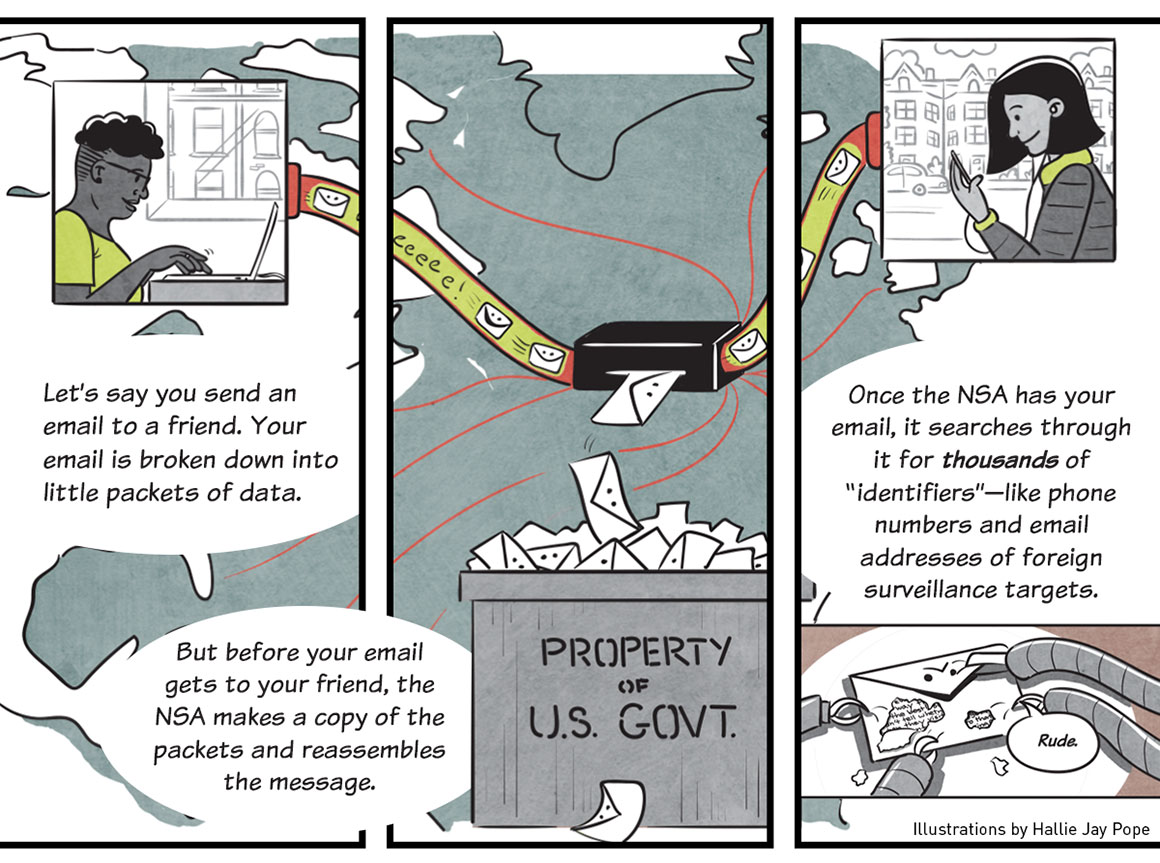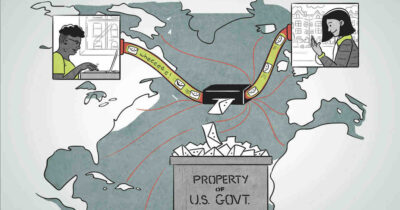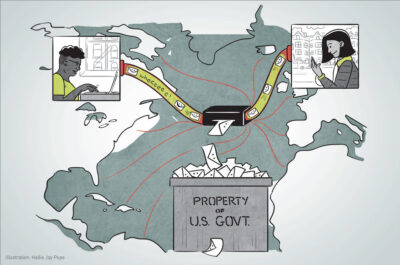
Wikimedia v. NSA - Challenge to Upstream Surveillance
What's at Stake
The ACLU is challenging the constitutionality of the NSA’s mass interception and searching of Americans’ international Internet communications. At issue is the NSA’s “Upstream” surveillance, through which the U.S. government systematically monitors private emails, messages, and other data flowing into and out of the country on the Internet’s central arteries. The ACLU’s lawsuit was brought on behalf of the Wikimedia Foundation and eight legal, human rights, and media organizations, which together engage in trillions of sensitive communications and have been harmed by Upstream surveillance.
Summary
Although the government has publicly revealed a great deal of information about Upstream surveillance, it invoked “state secrets” to have the case dismissed after years of litigation in the lower courts. In August 2022, the ACLU, Knight Institute, and Cooley LLP filed a petition on behalf of Wikimedia urging the Supreme Court to hear the case and hold that the state secrets privilege does not permit dismissal given the extensive public evidence. In February 2023, the Supreme Court denied Wikimedia's petition, bringing the case to an end.
The original plaintiffs in the lawsuit included: Wikimedia Foundation, The National Association of Criminal Defense Lawyers, Human Rights Watch, Amnesty International USA, PEN American Center, Global Fund for Women, The Nation Magazine, The Rutherford Institute, and The Washington Office on Latin America. These plaintiffs’ sensitive communications have been copied, searched, and likely retained by the NSA. Upstream surveillance hinders the plaintiffs’ ability to ensure the basic confidentiality of their communications with crucial contacts abroad – among them journalists, colleagues, clients, victims of human rights abuses, and the tens of millions of people who read and edit Wikipedia pages.
Upstream surveillance, which the government claims is authorized by the Section 702 of the FISA Amendments Act, is designed to ensnare all of Americans’ international communications, including emails, web-browsing content, and search engine queries. With the help of companies like Verizon and AT&T, the NSA has installed surveillance devices on the internet “backbone” – the network of high-capacity cables, switches, and routers across which Internet traffic travels.
The NSA intercepts and copies private communications in bulk while they are in transit, and then searches their contents using tens of thousands of keywords associated with NSA targets. These targets, chosen by intelligence analysts, are never approved by any court, and the limitations that do exist are weak and riddled with exceptions.
Under Section 702, the NSA may target any foreigner outside the United States believed likely to communicate “foreign intelligence information” – a pool of potential targets so broad that it encompasses journalists, academic researchers, corporations, aid workers, business persons, and others who are not suspected of any wrongdoing.
Through its general, indiscriminate searches and seizures of the plaintiffs’ communications, Upstream surveillance invades their Fourth Amendment right to privacy, infringes on their First Amendment rights to free expression and association, and exceeds the statutory limits of Section 702 itself. The nature of plaintiffs’ work and the law’s permissive guidelines for targeting make it likely that the NSA is also retaining and reading their communications.
The ACLU filed an earlier challenge to surveillance conducted under Section 702 – Clapper v. Amnesty – in 2008. In a 5-4 vote, the Supreme Court dismissed the case on the grounds that the plaintiffs could not prove they had been spied on. Edward Snowden has said that the ruling contributed to his decision to expose the breadth of NSA surveillance in June 2013. Among his disclosures was Upstream surveillance, the existence of which was later confirmed by the government.
After Wikimedia and its co-plaintiffs filed this challenge in 2015, the case was initially dismissed in the district court, only to be reversed in part by the Fourth Circuit court of appeals. Wikimedia was permitted to go forward and relied on the extensive public evidence about Upstream surveillance to show that some of its trillions of communications are being seized and searched by the NSA. However, the district court dismissed the case again in 2018 based on the government’s claims that further litigation was barred by the “state secrets privilege.” On appeal a second time, a divided Fourth Circuit upheld the district court’s dismissal, ruling that although Wikimedia had presented public evidence that its communications are subject to Upstream surveillance, further litigation could expose state secrets. In August 2022, Wikimedia filed a petition for certiorari with the Supreme Court.
Our clients advocate for human and civil rights, unimpeded access to knowledge, and a free press. Their work is essential to a functioning democracy. When their sensitive and privileged communications are monitored by the U.S. government, they cannot work freely and their effectiveness is curtailed – to the detriment of Americans and others around the world. In the face of the government’s claims of secrecy, the Supreme Court should make clear that NSA surveillance is not beyond the reach of our public courts.
The Supreme Court denied our petition for a writ of certiorari on February 21, 2023.
Legal Documents
-
01/24/2023
Reply Brief for Petitioner -
01/06/2023
Respondents' Brief in Opposition -
02/06/2023
Amicus Briefs in Support of Petitioner -
- Brennan Center for Justice, Clause 40 Foundation, Due Process Institute, Electronic Frontier Foundation, Electronic Privacy Information Center, FreedomWorks Foundation, the Project for Privacy and Surveillance Accountability, and TechFreedom
- Professor Laura K. Donohue
- Former Federal Judges
Wikimedia v. NSA - Challenge to Upstream SurveillanceLegal DocumentsBrennan Center for Justice, Clause 40 Foundation, Due Process Institute, Electronic Frontier Foundation, Electronic Privacy Information Center, FreedomWorks Foundation, the Project for Privacy and Surveillance Accountability, and TechFreedomDate Filed: 09/30/2022
Court: Supreme Court (U.S.)
Download DocumentWikimedia v. NSA - Challenge to Upstream SurveillanceLegal DocumentsProfessor Laura K. DonohueDate Filed: 09/29/2022
Court: Supreme Court (U.S.)
Download DocumentWikimedia v. NSA - Challenge to Upstream SurveillanceLegal DocumentsFormer Federal JudgesDate Filed: 09/29/2022
Court: Supreme Court (U.S.)
Download Document -
08/26/2022
Petition for Writ of Certiorari
Date Filed: 01/24/2023
Court: Supreme Court (U.S.)
Download DocumentDate Filed: 01/06/2023
Court: Supreme Court (U.S.)
Download DocumentDate Filed: 08/26/2022
Court: Supreme Court (U.S.)
Download Document-
12/09/2021
Government's Response to the Petition for Rehearing En Banc -
10/29/2021
Plaintiff's Petition for Rehearing En Banc -
09/29/2021
Judgment Order -
09/15/2021
Opinion -
12/24/2020
Supplemental Authority -
09/04/2020
Plaintiff's Reply Brief -
08/07/2020
Defendants' Response Brief -
07/08/2020
Amicus Briefs in Support of Plaintiff -
- Professor Stephen Vladeck
- Network Engineers and Technologists
- Americans for Prosperity Foundation, Brennan Center for Justice, EFF, Electronic Privacy Information Center, Freedomworks Foundation and Tech Freedom
- Evidence Law Professors
- Center for Democracy & Technology and New America's Open Technology Institute
Wikimedia v. NSA - Challenge to Upstream SurveillanceLegal DocumentsProfessor Stephen VladeckDate Filed: 07/08/2020
Court: Appeals Court (4th Cir.) II
Download DocumentWikimedia v. NSA - Challenge to Upstream SurveillanceLegal DocumentsNetwork Engineers and TechnologistsDate Filed: 07/08/2020
Court: Appeals Court (4th Cir.) II
Download DocumentWikimedia v. NSA - Challenge to Upstream SurveillanceLegal DocumentsAmericans for Prosperity Foundation, Brennan Center for Justice, EFF, Electronic Privacy Information Center, Freedomworks Foundation and Tech FreedomDate Filed: 07/08/2020
Court: Appeals Court (4th Cir.) II
Download DocumentWikimedia v. NSA - Challenge to Upstream SurveillanceLegal DocumentsEvidence Law ProfessorsDate Filed: 07/08/2020
Court: Appeals Court (4th Cir.) II
Download DocumentWikimedia v. NSA - Challenge to Upstream SurveillanceLegal DocumentsCenter for Democracy & Technology and New America's Open Technology InstituteDate Filed: 07/08/2020
Court: Appeals Court (4th Cir.) II
Download Document -
07/01/2020
Plaintiff's Opening Brief -
-
Joint Appendix Vol. 1-3 -
Joint Appendix Vol. 4-5 -
Joint Appendix Vol. 6-7
Wikimedia v. NSA - Challenge to Upstream SurveillanceLegal DocumentsJoint Appendix Vol. 1-3Court: Appeals Court (4th Cir.) II
Download DocumentWikimedia v. NSA - Challenge to Upstream SurveillanceLegal DocumentsJoint Appendix Vol. 4-5Court: Appeals Court (4th Cir.) II
Download DocumentWikimedia v. NSA - Challenge to Upstream SurveillanceLegal DocumentsJoint Appendix Vol. 6-7Court: Appeals Court (4th Cir.) II
Download Document -
Date Filed: 12/09/2021
Court: Appeals Court (4th Cir.) II
Download DocumentDate Filed: 10/29/2021
Court: Appeals Court (4th Cir.) II
Download DocumentDate Filed: 09/29/2021
Court: Appeals Court (4th Cir.) II
Download DocumentDate Filed: 09/15/2021
Court: Appeals Court (4th Cir.) II
Download DocumentDate Filed: 12/24/2020
Court: Appeals Court (4th Cir.) II
Download DocumentDate Filed: 09/04/2020
Court: Appeals Court (4th Cir.) II
Download DocumentDate Filed: 08/07/2020
Court: Appeals Court (4th Cir.) II
Download DocumentDate Filed: 07/01/2020
Court: Appeals Court (4th Cir.) II
Download Document-
12/16/2019
Opinion -
03/22/2019
Government's Sur-Reply in Support Motion for Summary Judgment -
-
Exhibit List -
Exhibit 16: Third Declaration of Henning Schulzrinne -
Exhibit 17: Second Declaration of Alan J. Salzberg
Wikimedia v. NSA - Challenge to Upstream SurveillanceLegal DocumentsExhibit ListCourt: District Court (D. Md.) II
Download DocumentWikimedia v. NSA - Challenge to Upstream SurveillanceLegal DocumentsExhibit 16: Third Declaration of Henning SchulzrinneCourt: District Court (D. Md.) II
Download DocumentWikimedia v. NSA - Challenge to Upstream SurveillanceLegal DocumentsExhibit 17: Second Declaration of Alan J. SalzbergCourt: District Court (D. Md.) II
Download Document -
-
03/08/2019
Sur-Reply Brief in Opposition to Defendant's Motion for Summary Judgment -
-
Exhibit 1: Second Declaration of Scott Bradner -
Exhibit 2: Second Declaration of Jonathon Penney -
Exhibit 3: Second Declaration of Michelle Paulson -
Exhibit 4: Second Declaration of Tilman Bayer -
Exhibit 5: Second Declaration of Emily Temple-Wood
Wikimedia v. NSA - Challenge to Upstream SurveillanceLegal DocumentsExhibit 1: Second Declaration of Scott BradnerCourt: District Court (D. Md.) II
Download DocumentWikimedia v. NSA - Challenge to Upstream SurveillanceLegal DocumentsExhibit 2: Second Declaration of Jonathon PenneyCourt: District Court (D. Md.) II
Download DocumentWikimedia v. NSA - Challenge to Upstream SurveillanceLegal DocumentsExhibit 3: Second Declaration of Michelle PaulsonCourt: District Court (D. Md.) II
Download DocumentWikimedia v. NSA - Challenge to Upstream SurveillanceLegal DocumentsExhibit 4: Second Declaration of Tilman BayerCourt: District Court (D. Md.) II
Download DocumentWikimedia v. NSA - Challenge to Upstream SurveillanceLegal DocumentsExhibit 5: Second Declaration of Emily Temple-WoodCourt: District Court (D. Md.) II
Download Document -
-
02/15/2019
Reply Brief in Support of Defendant's Motion for Summary Judgment -
-
Exhibit List -
Exhibit 6: Second Declaration of Henning Schulzrinne -
Exhibit 7: Second Declaration of Alan J. Salzberg -
Exhibit 8: Second Declaration of James J. Gilligan -
Exhibit 9 -
Exhibit 10 -
Exhibit 11 -
Exhibit 12 -
Exhibit 13 -
Exhibit 14 -
Exhibit 15
Wikimedia v. NSA - Challenge to Upstream SurveillanceLegal DocumentsExhibit ListCourt: District Court (D. Md.) II
Download DocumentWikimedia v. NSA - Challenge to Upstream SurveillanceLegal DocumentsExhibit 6: Second Declaration of Henning SchulzrinneCourt: District Court (D. Md.) II
Download DocumentWikimedia v. NSA - Challenge to Upstream SurveillanceLegal DocumentsExhibit 7: Second Declaration of Alan J. SalzbergCourt: District Court (D. Md.) II
Download DocumentWikimedia v. NSA - Challenge to Upstream SurveillanceLegal DocumentsExhibit 8: Second Declaration of James J. GilliganCourt: District Court (D. Md.) II
Download DocumentWikimedia v. NSA - Challenge to Upstream SurveillanceLegal DocumentsExhibit 9Court: District Court (D. Md.) II
Download DocumentWikimedia v. NSA - Challenge to Upstream SurveillanceLegal DocumentsExhibit 10Court: District Court (D. Md.) II
Download DocumentWikimedia v. NSA - Challenge to Upstream SurveillanceLegal DocumentsExhibit 11Court: District Court (D. Md.) II
Download DocumentWikimedia v. NSA - Challenge to Upstream SurveillanceLegal DocumentsExhibit 12Court: District Court (D. Md.) II
Download DocumentWikimedia v. NSA - Challenge to Upstream SurveillanceLegal DocumentsExhibit 13Court: District Court (D. Md.) II
Download DocumentWikimedia v. NSA - Challenge to Upstream SurveillanceLegal DocumentsExhibit 14Court: District Court (D. Md.) II
Download DocumentWikimedia v. NSA - Challenge to Upstream SurveillanceLegal DocumentsExhibit 15Court: District Court (D. Md.) II
Download Document -
-
12/18/2018
Plaintiff's Brief in Opposition to Defendant's Motion for Summary Judgment -
-
Exhibit 1: Declaration of Scott Bradner -
Appendix 1 to the Bradner Declaration -
Appendix 2 to the Bradner Declaration -
Appendix 3 to the Bradner Declaration -
Exhibit 2: Declaration of Jonathon Penney -
Exhibit 3: Declaration of Michelle Paulson -
Exhibit 4: Declaration of James Alexander -
Exhibit 5: Declaration of Tilman Bayer -
Exhibit 6: Declaration of Emily Temple-Wood -
Exhibit 7: Declaration of Patrick Toomey -
Exhibit 8 -
Exhibit 9 -
Exhibit 10 -
Exhibit 11 -
Exhibit 12 -
Exhibit 13 -
Exhibit 14 -
Exhibit 15 -
Exhibit 16 -
Exhibit 17 -
Exhibit 18 -
Exhibit 19 -
Exhibit 20 -
Exhibit 21 -
Exhibit 22 -
Exhibit 23 -
Exhibit 24 -
Exhibit 25 -
Exhibit 26 -
Exhibit 27 -
Exhibit 28 -
Exhibit 29 -
Exhibit 30 -
Exhibit 31 -
Exhibit 32 -
Exhibit 33 -
Exhibit 34 -
Exhibit 35 -
Exhibit 36 -
Exhibit 37 -
Exhibit 38 -
Exhibit 39 -
Exhibit 40 -
Exhibit 41 -
Exhibit 42 -
Exhibit 43 -
Exhibit 44 -
Exhibit 45
Wikimedia v. NSA - Challenge to Upstream SurveillanceLegal DocumentsExhibit 1: Declaration of Scott BradnerCourt: District Court (D. Md.) II
Download DocumentWikimedia v. NSA - Challenge to Upstream SurveillanceLegal DocumentsAppendix 1 to the Bradner DeclarationCourt: District Court (D. Md.) II
Download DocumentWikimedia v. NSA - Challenge to Upstream SurveillanceLegal DocumentsAppendix 2 to the Bradner DeclarationCourt: District Court (D. Md.) II
Download DocumentWikimedia v. NSA - Challenge to Upstream SurveillanceLegal DocumentsAppendix 3 to the Bradner DeclarationCourt: District Court (D. Md.) II
Download DocumentWikimedia v. NSA - Challenge to Upstream SurveillanceLegal DocumentsExhibit 2: Declaration of Jonathon PenneyCourt: District Court (D. Md.) II
Download DocumentWikimedia v. NSA - Challenge to Upstream SurveillanceLegal DocumentsExhibit 3: Declaration of Michelle PaulsonCourt: District Court (D. Md.) II
Download DocumentWikimedia v. NSA - Challenge to Upstream SurveillanceLegal DocumentsExhibit 4: Declaration of James AlexanderCourt: District Court (D. Md.) II
Download DocumentWikimedia v. NSA - Challenge to Upstream SurveillanceLegal DocumentsExhibit 5: Declaration of Tilman BayerCourt: District Court (D. Md.) II
Download DocumentWikimedia v. NSA - Challenge to Upstream SurveillanceLegal DocumentsExhibit 6: Declaration of Emily Temple-WoodCourt: District Court (D. Md.) II
Download DocumentWikimedia v. NSA - Challenge to Upstream SurveillanceLegal DocumentsExhibit 7: Declaration of Patrick ToomeyCourt: District Court (D. Md.) II
Download DocumentWikimedia v. NSA - Challenge to Upstream SurveillanceLegal DocumentsExhibit 8Court: District Court (D. Md.) II
Download DocumentWikimedia v. NSA - Challenge to Upstream SurveillanceLegal DocumentsExhibit 9Court: District Court (D. Md.) II
Download DocumentWikimedia v. NSA - Challenge to Upstream SurveillanceLegal DocumentsExhibit 10Court: District Court (D. Md.) II
Download DocumentWikimedia v. NSA - Challenge to Upstream SurveillanceLegal DocumentsExhibit 11Court: District Court (D. Md.) II
Download DocumentWikimedia v. NSA - Challenge to Upstream SurveillanceLegal DocumentsExhibit 12Court: District Court (D. Md.) II
Download DocumentWikimedia v. NSA - Challenge to Upstream SurveillanceLegal DocumentsExhibit 13Court: District Court (D. Md.) II
Download DocumentWikimedia v. NSA - Challenge to Upstream SurveillanceLegal DocumentsExhibit 14Court: District Court (D. Md.) II
Download DocumentWikimedia v. NSA - Challenge to Upstream SurveillanceLegal DocumentsExhibit 15Court: District Court (D. Md.) II
Download DocumentWikimedia v. NSA - Challenge to Upstream SurveillanceLegal DocumentsExhibit 16Court: District Court (D. Md.) II
Download DocumentWikimedia v. NSA - Challenge to Upstream SurveillanceLegal DocumentsExhibit 17Court: District Court (D. Md.) II
Download DocumentWikimedia v. NSA - Challenge to Upstream SurveillanceLegal DocumentsExhibit 18Court: District Court (D. Md.) II
Download DocumentWikimedia v. NSA - Challenge to Upstream SurveillanceLegal DocumentsExhibit 19Court: District Court (D. Md.) II
Download DocumentWikimedia v. NSA - Challenge to Upstream SurveillanceLegal DocumentsExhibit 20Court: District Court (D. Md.) II
Download DocumentWikimedia v. NSA - Challenge to Upstream SurveillanceLegal DocumentsExhibit 21Court: District Court (D. Md.) II
Download DocumentWikimedia v. NSA - Challenge to Upstream SurveillanceLegal DocumentsExhibit 22Court: District Court (D. Md.) II
Download DocumentWikimedia v. NSA - Challenge to Upstream SurveillanceLegal DocumentsExhibit 23Court: District Court (D. Md.) II
Download DocumentWikimedia v. NSA - Challenge to Upstream SurveillanceLegal DocumentsExhibit 24Court: District Court (D. Md.) II
Download DocumentWikimedia v. NSA - Challenge to Upstream SurveillanceLegal DocumentsExhibit 25Court: District Court (D. Md.) II
Download DocumentWikimedia v. NSA - Challenge to Upstream SurveillanceLegal DocumentsExhibit 26Court: District Court (D. Md.) II
Download DocumentWikimedia v. NSA - Challenge to Upstream SurveillanceLegal DocumentsExhibit 27Court: District Court (D. Md.) II
Download DocumentWikimedia v. NSA - Challenge to Upstream SurveillanceLegal DocumentsExhibit 28Court: District Court (D. Md.) II
Download DocumentWikimedia v. NSA - Challenge to Upstream SurveillanceLegal DocumentsExhibit 29Court: District Court (D. Md.) II
Download DocumentWikimedia v. NSA - Challenge to Upstream SurveillanceLegal DocumentsExhibit 30Court: District Court (D. Md.) II
Download DocumentWikimedia v. NSA - Challenge to Upstream SurveillanceLegal DocumentsExhibit 31Court: District Court (D. Md.) II
Download DocumentWikimedia v. NSA - Challenge to Upstream SurveillanceLegal DocumentsExhibit 32Court: District Court (D. Md.) II
Download DocumentWikimedia v. NSA - Challenge to Upstream SurveillanceLegal DocumentsExhibit 33Court: District Court (D. Md.) II
Download DocumentWikimedia v. NSA - Challenge to Upstream SurveillanceLegal DocumentsExhibit 34Court: District Court (D. Md.) II
Download DocumentWikimedia v. NSA - Challenge to Upstream SurveillanceLegal DocumentsExhibit 35Court: District Court (D. Md.) II
Download DocumentWikimedia v. NSA - Challenge to Upstream SurveillanceLegal DocumentsExhibit 36Court: District Court (D. Md.) II
Download DocumentWikimedia v. NSA - Challenge to Upstream SurveillanceLegal DocumentsExhibit 37Court: District Court (D. Md.) II
Download DocumentWikimedia v. NSA - Challenge to Upstream SurveillanceLegal DocumentsExhibit 38Court: District Court (D. Md.) II
Download DocumentWikimedia v. NSA - Challenge to Upstream SurveillanceLegal DocumentsExhibit 39Court: District Court (D. Md.) II
Download DocumentWikimedia v. NSA - Challenge to Upstream SurveillanceLegal DocumentsExhibit 40Court: District Court (D. Md.) II
Download DocumentWikimedia v. NSA - Challenge to Upstream SurveillanceLegal DocumentsExhibit 41Court: District Court (D. Md.) II
Download DocumentWikimedia v. NSA - Challenge to Upstream SurveillanceLegal DocumentsExhibit 42Court: District Court (D. Md.) II
Download DocumentWikimedia v. NSA - Challenge to Upstream SurveillanceLegal DocumentsExhibit 43Court: District Court (D. Md.) II
Download DocumentWikimedia v. NSA - Challenge to Upstream SurveillanceLegal DocumentsExhibit 44Court: District Court (D. Md.) II
Download DocumentWikimedia v. NSA - Challenge to Upstream SurveillanceLegal DocumentsExhibit 45Court: District Court (D. Md.) II
Download Document -
-
12/11/2018
Brief in Support of Defendants' Motion for Summary Judgment -
-
Exhibit List -
Exhibit 1 -
Exhibit 2 -
Exhibit 3 -
Exhibit 4 -
Exhibit 5
Wikimedia v. NSA - Challenge to Upstream SurveillanceLegal DocumentsExhibit ListCourt: District Court (D. Md.) II
Download DocumentWikimedia v. NSA - Challenge to Upstream SurveillanceLegal DocumentsExhibit 1Court: District Court (D. Md.) II
Download DocumentWikimedia v. NSA - Challenge to Upstream SurveillanceLegal DocumentsExhibit 2Court: District Court (D. Md.) II
Download DocumentWikimedia v. NSA - Challenge to Upstream SurveillanceLegal DocumentsExhibit 3Court: District Court (D. Md.) II
Download DocumentWikimedia v. NSA - Challenge to Upstream SurveillanceLegal DocumentsExhibit 4Court: District Court (D. Md.) II
Download DocumentWikimedia v. NSA - Challenge to Upstream SurveillanceLegal DocumentsExhibit 5Court: District Court (D. Md.) II
Download Document -
-
08/20/2018
Order Denying Plaintiff's Motion to Compel Discovery Responses and Deposition Testimony -
08/20/2018
Memorandum Opinion Denying Plaintiff's Motion to Compel Discovery Responses and Deposition Testimony -
07/06/2018
Plaintiff's Supplemental Brief in Response to the Court's June 29, 2018 Order -
07/06/2018
Defendant's Supplemental Brief in Opposition to Plaintiff's Motion to Compel -
06/28/2018
Errata to the Defendant's Memo of Points and Authorities in Opp to Plaintiff’s Motion to Compel Discovery Responses and Deposition Testimony -
-
Corrected Version of Defendants’ Memorandum of Points and Authorities in Opp to Plaintiff's Motion to Compel
Wikimedia v. NSA - Challenge to Upstream SurveillanceLegal DocumentsCorrected Version of Defendants’ Memorandum of Points and Authorities in Opp to Plaintiff's Motion to CompelCourt: District Court (D. Md.) II
Download Document -
-
05/18/2018
Plaintiff's Reply in Support of Its Motion to Compel -
-
Declaration of Ashley Gorski -
Exhibit 1 -
Exhibit 2
Wikimedia v. NSA - Challenge to Upstream SurveillanceLegal DocumentsDeclaration of Ashley GorskiCourt: District Court (D. Md.) II
Download DocumentWikimedia v. NSA - Challenge to Upstream SurveillanceLegal DocumentsExhibit 1Court: District Court (D. Md.) II
Download DocumentWikimedia v. NSA - Challenge to Upstream SurveillanceLegal DocumentsExhibit 2Court: District Court (D. Md.) II
Download Document -
-
04/28/2018
Defendant's Memorandum in Opposition to Plaintiff's Motion to Compel Discovery Responses and Deposition Testimony -
-
Exhibit A -
Exhibit B -
Exhibit C -
Exhibit D -
Proposed Order
Wikimedia v. NSA - Challenge to Upstream SurveillanceLegal DocumentsExhibit ACourt: District Court (D. Md.) II
Download DocumentWikimedia v. NSA - Challenge to Upstream SurveillanceLegal DocumentsExhibit BCourt: District Court (D. Md.) II
Download DocumentWikimedia v. NSA - Challenge to Upstream SurveillanceLegal DocumentsExhibit CCourt: District Court (D. Md.) II
Download DocumentWikimedia v. NSA - Challenge to Upstream SurveillanceLegal DocumentsExhibit DCourt: District Court (D. Md.) II
Download DocumentWikimedia v. NSA - Challenge to Upstream SurveillanceLegal DocumentsProposed OrderCourt: District Court (D. Md.) II
Download Document -
-
04/27/2018
Defendant's Notice of Lodging Classified Declaration -
04/18/2018
Plaintiff's Supplement to Motion to Compel -
03/26/2018
Government's Motion to Compel Discovery -
-
Government's Memo of Points and Authorities in Support of its Motion to Compel Discovery -
Exhibit 1 -
Exhibit 2 -
Exhibit 3 -
Proposed Order
Wikimedia v. NSA - Challenge to Upstream SurveillanceLegal DocumentsGovernment's Memo of Points and Authorities in Support of its Motion to Compel DiscoveryCourt: District Court (D. Md.) II
Download DocumentWikimedia v. NSA - Challenge to Upstream SurveillanceLegal DocumentsExhibit 1Court: District Court (D. Md.) II
Download DocumentWikimedia v. NSA - Challenge to Upstream SurveillanceLegal DocumentsExhibit 2Court: District Court (D. Md.) II
Download DocumentWikimedia v. NSA - Challenge to Upstream SurveillanceLegal DocumentsExhibit 3Court: District Court (D. Md.) II
Download DocumentWikimedia v. NSA - Challenge to Upstream SurveillanceLegal DocumentsProposed OrderCourt: District Court (D. Md.) II
Download Document -
-
03/26/2018
Plaintiff's Motion to Compel Discovery Responses and Deposition Testimony -
-
Plaintiff's Memo of Law in Support of Its Motion to Compel -
Declaration of Patrick Toomey -
Exhibit 1 -
Exhibits 2-30 -
Proposed Order
Wikimedia v. NSA - Challenge to Upstream SurveillanceLegal DocumentsPlaintiff's Memo of Law in Support of Its Motion to CompelCourt: District Court (D. Md.) II
Download DocumentWikimedia v. NSA - Challenge to Upstream SurveillanceLegal DocumentsDeclaration of Patrick ToomeyCourt: District Court (D. Md.) II
Download DocumentWikimedia v. NSA - Challenge to Upstream SurveillanceLegal DocumentsExhibit 1Court: District Court (D. Md.) II
Download DocumentWikimedia v. NSA - Challenge to Upstream SurveillanceLegal DocumentsExhibits 2-30Court: District Court (D. Md.) II
Download DocumentWikimedia v. NSA - Challenge to Upstream SurveillanceLegal DocumentsProposed OrderCourt: District Court (D. Md.) II
Download Document -
-
12/29/2017
Stipulated Protective Order -
10/16/2017
Defendants' Answer to Plaintiff's First Amended Complaint for Declaratory and Injunctive Relief -
10/05/2017
Order Granting 5 Months Discovery -
09/28/2017
Joint Discovery Plan -
09/27/2017
Order re. Joint Plan for Discovery on Jurisdictional Issues -
09/22/2017
Transcript of Proceedings -
09/01/2017
Plaintiff's Reply to Government's Response re. Merits Proceedings -
08/28/2017
Government's Response to Plaintiff's Brief re. Merits Proceedings -
08/11/2017
Plaintiff's Brief in Response to August 2, 2017 Order -
08/02/2017
Order Granting Motion for Status Conference -
07/31/2017
Government's Response to Plaintiff's Motion for a Status Conference -
07/07/2017
Plaintiff's Motion for a Status Conference
Date Filed: 12/16/2019
Court: District Court (D. Md.) II
Download DocumentDate Filed: 03/22/2019
Court: District Court (D. Md.) II
Download DocumentDate Filed: 03/08/2019
Court: District Court (D. Md.) II
Download DocumentDate Filed: 02/15/2019
Court: District Court (D. Md.) II
Download DocumentDate Filed: 12/18/2018
Court: District Court (D. Md.) II
Download DocumentDate Filed: 12/11/2018
Court: District Court (D. Md.) II
Download DocumentDate Filed: 08/20/2018
Court: District Court (D. Md.) II
Download DocumentDate Filed: 08/20/2018
Court: District Court (D. Md.) II
Download DocumentDate Filed: 07/06/2018
Court: District Court (D. Md.) II
Download DocumentDate Filed: 07/06/2018
Court: District Court (D. Md.) II
Download DocumentDate Filed: 06/28/2018
Court: District Court (D. Md.) II
Download DocumentDate Filed: 05/18/2018
Court: District Court (D. Md.) II
Download DocumentDate Filed: 04/28/2018
Court: District Court (D. Md.) II
Download DocumentDate Filed: 04/27/2018
Court: District Court (D. Md.) II
Download DocumentDate Filed: 04/18/2018
Court: District Court (D. Md.) II
Download DocumentDate Filed: 03/26/2018
Court: District Court (D. Md.) II
Download DocumentDate Filed: 03/26/2018
Court: District Court (D. Md.) II
Download DocumentDate Filed: 12/29/2017
Court: District Court (D. Md.) II
Download DocumentDate Filed: 10/16/2017
Court: District Court (D. Md.) II
Download DocumentDate Filed: 10/05/2017
Court: District Court (D. Md.) II
Download DocumentDate Filed: 09/28/2017
Court: District Court (D. Md.) II
Download DocumentDate Filed: 09/27/2017
Court: District Court (D. Md.) II
Download DocumentDate Filed: 09/22/2017
Court: District Court (D. Md.) II
Download DocumentDate Filed: 09/01/2017
Court: District Court (D. Md.) II
Download DocumentDate Filed: 08/28/2017
Court: District Court (D. Md.) II
Download DocumentDate Filed: 08/11/2017
Court: District Court (D. Md.) II
Download DocumentDate Filed: 08/02/2017
Court: District Court (D. Md.) II
Download DocumentDate Filed: 07/31/2017
Court: District Court (D. Md.) II
Download DocumentDate Filed: 07/07/2017
Court: District Court (D. Md.) II
Download Document-
07/17/2017
Mandate -
05/23/2017
Judgment -
05/23/2017
Opinion -
10/19/2016
Defendants' Response to Letter of Supplemental Authorities -
10/12/2016
Plaintiffs' Notice of Supplemental Authorities -
06/21/2016
Amicus Briefs -
- Law Professors
- Electronic Frontier Foundation
- Computer Scientists and Technologists
- First Amendment Legal Scholars
- U.S. Justice Foundation, et al.
- The Reporters Committee for Freedom of the Press, et al.
Wikimedia v. NSA - Challenge to Upstream SurveillanceLegal DocumentsLaw ProfessorsDate Filed: 02/24/2016
Court: Appeals Court (4th Cir.) I
Download DocumentWikimedia v. NSA - Challenge to Upstream SurveillanceLegal DocumentsElectronic Frontier FoundationDate Filed: 02/24/2016
Court: Appeals Court (4th Cir.) I
Download DocumentWikimedia v. NSA - Challenge to Upstream SurveillanceLegal DocumentsComputer Scientists and TechnologistsDate Filed: 02/24/2016
Court: Appeals Court (4th Cir.) I
Download DocumentWikimedia v. NSA - Challenge to Upstream SurveillanceLegal DocumentsFirst Amendment Legal ScholarsDate Filed: 02/24/2016
Court: Appeals Court (4th Cir.) I
Download DocumentWikimedia v. NSA - Challenge to Upstream SurveillanceLegal DocumentsU.S. Justice Foundation, et al.Date Filed: 02/24/2016
Court: Appeals Court (4th Cir.) I
Download DocumentWikimedia v. NSA - Challenge to Upstream SurveillanceLegal DocumentsThe Reporters Committee for Freedom of the Press, et al.Date Filed: 02/24/2016
Court: Appeals Court (4th Cir.) I
Download Document -
05/06/2016
Plaintiffs' Reply Brief -
04/11/2016
Defendants' Response Brief -
02/17/2016
Plaintiffs' Opening Brief -
02/17/2016
Joint Appendix
Date Filed: 07/17/2017
Court: Appeals Court (4th Cir.) I
Download DocumentDate Filed: 05/23/2017
Court: Appeals Court (4th Cir.) I
Download DocumentDate Filed: 05/23/2017
Court: Appeals Court (4th Cir.) I
Download DocumentDate Filed: 10/19/2016
Court: Appeals Court (4th Cir.) I
Download DocumentDate Filed: 10/12/2016
Court: Appeals Court (4th Cir.) I
Download DocumentDate Filed: 05/06/2016
Court: Appeals Court (4th Cir.) I
Download DocumentDate Filed: 04/11/2016
Court: Appeals Court (4th Cir.) I
Download DocumentDate Filed: 02/17/2016
Court: Appeals Court (4th Cir.) I
Download DocumentDate Filed: 02/17/2016
Court: Appeals Court (4th Cir.) I
Download Document-
12/18/2015
U.S. Court of Appeals Case Number -
12/15/2015
Notice of Appeal -
10/23/2015
Order Granting Government's Motion to Dismiss -
10/23/2015
D. Md. Opinion -
09/25/2015
Oral Argument Transcript -
09/17/2015
Government's Reply in Support of Motion to Dismiss First Amended Complaint -
-
Exhibit 1
Wikimedia v. NSA - Challenge to Upstream SurveillanceLegal DocumentsExhibit 1Court: District Court (D. Md.) I
Download Document -
-
09/03/2015
Plaintiffs' Memorandum of Law in Opposition to Defendants' Motion to Dismiss -
09/03/2015
Amicus Briefs in Support of Plaintiffs -
- First Amendment Legal Scholars
- Am. Booksellers Ass'n et al
Wikimedia v. NSA - Challenge to Upstream SurveillanceLegal DocumentsFirst Amendment Legal ScholarsDate Filed: 09/03/2015
Court: District Court (D. Md.) I
Download DocumentWikimedia v. NSA - Challenge to Upstream SurveillanceLegal DocumentsAm. Booksellers Ass'n et alDate Filed: 09/03/2015
Court: District Court (D. Md.) I
Download Document -
08/06/2015
Defendants' Renewed MTD -
-
Declaration of Dr. Alan Salzberg -
Declaration of Robert T. Lee - Part I -
Declaration of Robert T. Lee - Part II -
Declaration of Robert T. Lee - Part III -
Declaration of Robert T. Lee - Part IV -
Declaration of Robert T. Lee - Part V -
Defendants' Exhibit 1 to MTD -
Defendants' Exhibit 2 to MTD -
Defendants' Exhibit 3 to MTD -
Defendants' Exhibit 4 to MTD -
Defendants' Exhibit 5 to MTD -
Defendants' Exhibit 6 to MTD -
Defendants' Exhibit 7 to MTD -
Defendants' Exhibit 8 to MTD -
Defendants' Exhibit 9 to MTD -
Index of Exhibits
Wikimedia v. NSA - Challenge to Upstream SurveillanceLegal DocumentsDeclaration of Dr. Alan SalzbergCourt: District Court (D. Md.) I
Download DocumentWikimedia v. NSA - Challenge to Upstream SurveillanceLegal DocumentsDeclaration of Robert T. Lee - Part ICourt: District Court (D. Md.) I
Download DocumentWikimedia v. NSA - Challenge to Upstream SurveillanceLegal DocumentsDeclaration of Robert T. Lee - Part IICourt: District Court (D. Md.) I
Download DocumentWikimedia v. NSA - Challenge to Upstream SurveillanceLegal DocumentsDeclaration of Robert T. Lee - Part IIICourt: District Court (D. Md.) I
Download DocumentWikimedia v. NSA - Challenge to Upstream SurveillanceLegal DocumentsDeclaration of Robert T. Lee - Part IVCourt: District Court (D. Md.) I
Download DocumentWikimedia v. NSA - Challenge to Upstream SurveillanceLegal DocumentsDeclaration of Robert T. Lee - Part VCourt: District Court (D. Md.) I
Download DocumentWikimedia v. NSA - Challenge to Upstream SurveillanceLegal DocumentsDefendants' Exhibit 1 to MTDCourt: District Court (D. Md.) I
Download DocumentWikimedia v. NSA - Challenge to Upstream SurveillanceLegal DocumentsDefendants' Exhibit 2 to MTDCourt: District Court (D. Md.) I
Download DocumentWikimedia v. NSA - Challenge to Upstream SurveillanceLegal DocumentsDefendants' Exhibit 3 to MTDCourt: District Court (D. Md.) I
Download DocumentWikimedia v. NSA - Challenge to Upstream SurveillanceLegal DocumentsDefendants' Exhibit 4 to MTDCourt: District Court (D. Md.) I
Download DocumentWikimedia v. NSA - Challenge to Upstream SurveillanceLegal DocumentsDefendants' Exhibit 5 to MTDCourt: District Court (D. Md.) I
Download DocumentWikimedia v. NSA - Challenge to Upstream SurveillanceLegal DocumentsDefendants' Exhibit 6 to MTDCourt: District Court (D. Md.) I
Download DocumentWikimedia v. NSA - Challenge to Upstream SurveillanceLegal DocumentsDefendants' Exhibit 7 to MTDCourt: District Court (D. Md.) I
Download DocumentWikimedia v. NSA - Challenge to Upstream SurveillanceLegal DocumentsDefendants' Exhibit 8 to MTDCourt: District Court (D. Md.) I
Download DocumentWikimedia v. NSA - Challenge to Upstream SurveillanceLegal DocumentsDefendants' Exhibit 9 to MTDCourt: District Court (D. Md.) I
Download DocumentWikimedia v. NSA - Challenge to Upstream SurveillanceLegal DocumentsIndex of ExhibitsCourt: District Court (D. Md.) I
Download Document -
-
06/22/2015
First Amended Complaint -
06/22/2015
Order Granting Plaintiffs' Motion to Amend Complaint -
06/19/2015
Plaintiffs' Motion to Amend Complaint -
06/12/2015
Order Amending the Briefing Schedule -
06/12/2015
Order Postponing Oral Argument to September 4, 2015 -
06/12/2015
Joint Motion to Amend the Briefing Schedule -
05/29/2015
Defendants' Motion to Dismiss (MTD) -
-
Index of Exhibits -
Exhibit 1 -
Exhibit 2 -
Exhibit 3 -
Exhibit 4A -
Exhibit 4B -
Exhibit 4C -
Exhibit 4D -
Exhibit 5 -
Exhibit 6 -
Proposed Order
Wikimedia v. NSA - Challenge to Upstream SurveillanceLegal DocumentsIndex of ExhibitsCourt: District Court (D. Md.) I
Download DocumentWikimedia v. NSA - Challenge to Upstream SurveillanceLegal DocumentsExhibit 1Court: District Court (D. Md.) I
Download DocumentWikimedia v. NSA - Challenge to Upstream SurveillanceLegal DocumentsExhibit 2Court: District Court (D. Md.) I
Download DocumentWikimedia v. NSA - Challenge to Upstream SurveillanceLegal DocumentsExhibit 3Court: District Court (D. Md.) I
Download DocumentWikimedia v. NSA - Challenge to Upstream SurveillanceLegal DocumentsExhibit 4ACourt: District Court (D. Md.) I
Download DocumentWikimedia v. NSA - Challenge to Upstream SurveillanceLegal DocumentsExhibit 4BCourt: District Court (D. Md.) I
Download DocumentWikimedia v. NSA - Challenge to Upstream SurveillanceLegal DocumentsExhibit 4CCourt: District Court (D. Md.) I
Download DocumentWikimedia v. NSA - Challenge to Upstream SurveillanceLegal DocumentsExhibit 4DCourt: District Court (D. Md.) I
Download DocumentWikimedia v. NSA - Challenge to Upstream SurveillanceLegal DocumentsExhibit 5Court: District Court (D. Md.) I
Download DocumentWikimedia v. NSA - Challenge to Upstream SurveillanceLegal DocumentsExhibit 6Court: District Court (D. Md.) I
Download DocumentWikimedia v. NSA - Challenge to Upstream SurveillanceLegal DocumentsProposed OrderCourt: District Court (D. Md.) I
Download Document -
-
05/29/2015
Order Granting Parties' Joint Motion to Conduct Hearings in Alexandria, VA -
05/29/2015
Joint Motion to Conduct Hearings in Alexandria, VA -
05/28/2015
Order Denying Plaintiffs' Motion to Set a Date for the Filing of Amicus Briefs -
05/27/2015
Plaintiffs' Motion to Set a Date for the Filing of Amicus Briefs -
05/14/2015
Scheduling Order -
04/30/2015
Order Granting Motion to Set Status Conference -
04/28/2015
Plaintiffs' Proposed Order re: Status Conference -
04/28/2015
Plaintiffs' Response to Defendants' Motion to Set a Status Conference -
04/24/2015
Defendants' Proposed Order re: Status Conference -
04/24/2015
Defendants' Motion to Set a Status Conference -
03/10/2015
Complaint
Date Filed: 12/18/2015
Court: District Court (D. Md.) I
Download DocumentDate Filed: 12/15/2015
Court: District Court (D. Md.) I
Download DocumentDate Filed: 10/23/2015
Court: District Court (D. Md.) I
Download DocumentDate Filed: 10/23/2015
Court: District Court (D. Md.) I
Download DocumentDate Filed: 09/25/2015
Court: District Court (D. Md.) I
Download DocumentDate Filed: 09/17/2015
Court: District Court (D. Md.) I
Download DocumentDate Filed: 09/03/2015
Court: District Court (D. Md.) I
Download DocumentDate Filed: 08/06/2015
Court: District Court (D. Md.) I
Download DocumentDate Filed: 06/22/2015
Court: District Court (D. Md.) I
Download DocumentDate Filed: 06/22/2015
Court: District Court (D. Md.) I
Download DocumentDate Filed: 06/19/2015
Court: District Court (D. Md.) I
Download DocumentDate Filed: 06/12/2015
Court: District Court (D. Md.) I
Download DocumentDate Filed: 06/12/2015
Court: District Court (D. Md.) I
Download DocumentDate Filed: 06/12/2015
Court: District Court (D. Md.) I
Download DocumentDate Filed: 05/29/2015
Court: District Court (D. Md.) I
Download DocumentDate Filed: 05/29/2015
Court: District Court (D. Md.) I
Download DocumentDate Filed: 05/29/2015
Court: District Court (D. Md.) I
Download DocumentDate Filed: 05/28/2015
Court: District Court (D. Md.) I
Download DocumentDate Filed: 05/27/2015
Court: District Court (D. Md.) I
Download DocumentDate Filed: 05/14/2015
Court: District Court (D. Md.) I
Download DocumentDate Filed: 04/30/2015
Court: District Court (D. Md.) I
Download DocumentDate Filed: 04/28/2015
Court: District Court (D. Md.) I
Download DocumentDate Filed: 04/28/2015
Court: District Court (D. Md.) I
Download DocumentDate Filed: 04/24/2015
Court: District Court (D. Md.) I
Download DocumentDate Filed: 04/24/2015
Court: District Court (D. Md.) I
Download DocumentDate Filed: 03/10/2015
Court: District Court (D. Md.) I
Download DocumentPress Releases
U.S. Supreme Court Declines to Hear Wikimedia Foundation’s Challenge to NSA Mass Surveillance
Wikimedia Foundation, ACLU, and Knight Institute Urge U.S. Supreme Court to Hear Challenge to NSA’s Mass Surveillance
Federal Appeals Court Dismisses Wikimedia's Challenge to NSA Internet Surveillance
Appeals Court Allows Wikimedia Challenge to NSA Internet Surveillance to Go Forward
Appeals Court to Hear Argument in ACLU Challenge to NSA Internet Surveillance
Court Dismisses ACLU Challenge to NSA Internet Surveillance




